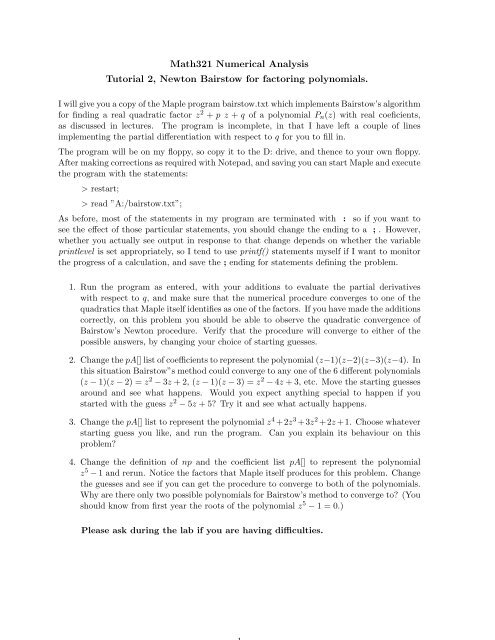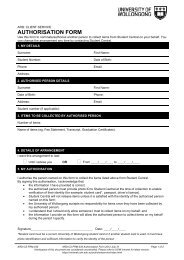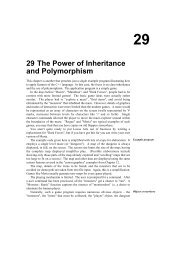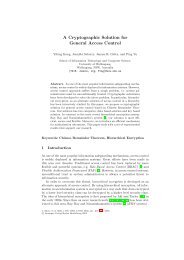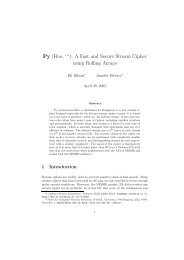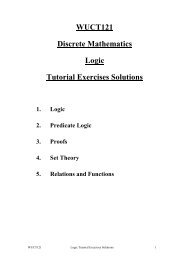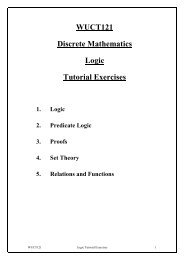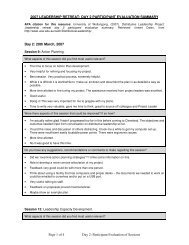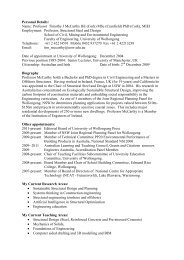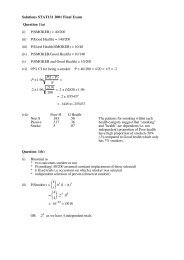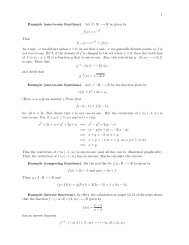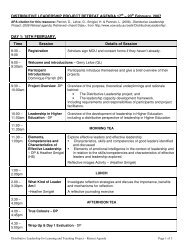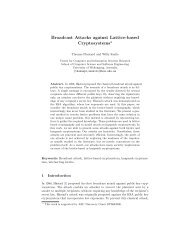Math321 Numerical Analysis Tutorial 2, Newton Bairstow for ...
Math321 Numerical Analysis Tutorial 2, Newton Bairstow for ...
Math321 Numerical Analysis Tutorial 2, Newton Bairstow for ...
Create successful ePaper yourself
Turn your PDF publications into a flip-book with our unique Google optimized e-Paper software.
<strong>Math321</strong> <strong>Numerical</strong> <strong>Analysis</strong><br />
<strong>Tutorial</strong> 2, <strong>Newton</strong> <strong>Bairstow</strong> <strong>for</strong> factoring polynomials.<br />
I will give you a copy of the Maple program bairstow.txt which implements <strong>Bairstow</strong>’s algorithm<br />
<strong>for</strong> finding a real quadratic factor z 2 + p z + q of a polynomial P n (z) with real coeficients,<br />
as discussed in lectures. The program is incomplete, in that I have left a couple of lines<br />
implementing the partial differentiation with respect to q <strong>for</strong> you to fill in.<br />
The program will be on my floppy, so copy it to the D: drive, and thence to your own floppy.<br />
After making corrections as required with Notepad, and saving you can start Maple and execute<br />
the program with the statements:<br />
> restart;<br />
> read ”A:/bairstow.txt”;<br />
As be<strong>for</strong>e, most of the statements in my program are terminated with : so if you want to<br />
see the effect of those particular statements, you should change the ending to a ; . However,<br />
whether you actually see output in response to that change depends on whether the variable<br />
printlevel is set appropriately, so I tend to use printf() statements myself if I want to monitor<br />
the progress of a calculation, and save the ; ending <strong>for</strong> statements defining the problem.<br />
1. Run the program as entered, with your additions to evaluate the partial derivatives<br />
with respect to q, and make sure that the numerical procedure converges to one of the<br />
quadratics that Maple itself identifies as one of the factors. If you have made the additions<br />
correctly, on this problem you should be able to observe the quadratic convergence of<br />
<strong>Bairstow</strong>’s <strong>Newton</strong> procedure. Verify that the procedure will converge to either of the<br />
possible answers, by changing your choice of starting guesses.<br />
2. Change the pA[] list of coefficients to represent the polynomial (z−1)(z−2)(z−3)(z−4). In<br />
this situation <strong>Bairstow</strong>”s method could converge to any one of the 6 different polynomials<br />
(z − 1)(z − 2) = z 2 − 3z + 2, (z − 1)(z − 3) = z 2 − 4z + 3, etc. Move the starting guesses<br />
around and see what happens. Would you expect anything special to happen if you<br />
started with the guess z 2 − 5z + 5? Try it and see what actually happens.<br />
3. Change the pA[] list to represent the polynomial z 4 +2z 3 +3z 2 +2z +1. Choose whatever<br />
starting guess you like, and run the program. Can you explain its behaviour on this<br />
problem?<br />
4. Change the definition of np and the coefficient list pA[] to represent the polynomial<br />
z 5 − 1 and rerun. Notice the factors that Maple itself produces <strong>for</strong> this problem. Change<br />
the guesses and see if you can get the procedure to converge to both of the polynomials.<br />
Why are there only two possible polynomials <strong>for</strong> <strong>Bairstow</strong>’s method to converge to? (You<br />
should know from first year the roots of the polynomial z 5 − 1 = 0.)<br />
Please ask during the lab if you are having difficulties.
# <strong>Bairstow</strong>’s algorithm <strong>for</strong> finding the roots of polynomials<br />
with (LinearAlgebra): #this package will solve the matrix equation<br />
np := 4;<br />
#the degree of the monic polynomial<br />
pA := array(0..np, [-1, -1, 0, 1, 1]);<br />
#coefficients of increasing powers, starting with z^0<br />
#usually a[np] will be 1, (a monic polynomial)<br />
pN := pA[0]+x*(pA[1]+x*(pA[2]+x*(pA[3]+x*pA[4])));<br />
fac := factor(pN);<br />
# the analytic <strong>for</strong>m<br />
# Maple’s factors<br />
pstart:= 0.5;<br />
qstart:= 2.0;<br />
htolerance := 1.0e-6;<br />
iterations := 20;<br />
#starting guess <strong>for</strong> p and q<br />
#relative accuracy of numerical answer<br />
#maximum number, in case someting goes wrong<br />
<strong>Bairstow</strong> := proc(n, a, pstart, qstart)<br />
local i, j, p, q, h, dbdp, dbdq, r, drdp, drdq, s,<br />
dsdp, dsdq, finish, A, b, C, det, hsize, psize;<br />
global htolerance, iterations;<br />
j := 1: #Iteration counter<br />
p := pstart:<br />
q := qstart:<br />
finish := 0;<br />
while (finish < 1) do<br />
b[n-1] := 0.0:<br />
b[n-2] := 1.0:<br />
dbdp[n-1] := 0.0:<br />
dbdp[n-2] := 0.0:<br />
dbdq[n-1] := 0.0:<br />
dbdq[n-2] := 0.0:<br />
<strong>for</strong> i from n-3 by -1 to 0 do<br />
b[i] := evalf(a[i+2] - p*b[i+1] - q*b[i+2]):<br />
dbdp[i] := evalf(-b[i+1] - p*dbdp[i+1] - q*dbdp[i+2]):<br />
dbdq[i] := evalf(-p*dbdq[i+1] - q*dbdq[i+2] - b[i+2]):<br />
end do:<br />
r := evalf(a[1] - p*b[0] - q*b[1]):<br />
s := evalf(a[0] - q*b[0]):<br />
drdp := evalf(-b[0] - p*dbdp[0] - q*dbdp[1]):<br />
dsdp := evalf(-q*dbdp[0]):<br />
drdq := evaf(-p*dbdq[0] - q*dbdq[1] - b[1]):<br />
dsdq := evalf(-q*dbdq[0] - b[0]):<br />
printf("r = %e, s = %e\n", r,s);<br />
A := Matrix(2,2,[ [drdp,drdq], [dsdp,dsdq] ]):<br />
C := Vector( [-r, -s]);<br />
det := A[1,1]*A[2,2] - A[1,2]*A[2,1]:<br />
#Using Maple LinearAlgebra
if ( det 0 ) then<br />
h := LinearSolve(A,C):<br />
p:= p + h[1]:<br />
q:= q + h[2]:<br />
# update p and q<br />
hsize := sqrt( h[1]^2 + h[2]^2): # test <strong>for</strong> convergence<br />
psize := sqrt( p^2 + q^2):<br />
if ( hsize/psize < htolerance ) then<br />
finish := 3:<br />
# OK, we have converged<br />
else<br />
j := j + 1:<br />
if (j > iterations) then<br />
finish := 2:<br />
# Maximum iteration count reached<br />
end if:<br />
end if:<br />
else<br />
finish := 1:<br />
# the derivative matrix is singular<br />
end if:<br />
end do:<br />
if ( finish < 2 ) then<br />
printf("p = %e, q = %e, determinant zero, process aborted\n",p,q);<br />
elif (finish < 3) then<br />
printf("p = %e, q = %e, iterations exceeded, process aborted\n",p,q);<br />
else<br />
printf("p = %e, q = %e, converged in %d iterations\n", p,q,j);<br />
end if;<br />
return(finish):<br />
end proc:<br />
success := <strong>Bairstow</strong>(np, pA, pstart, qstart);


